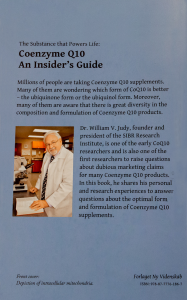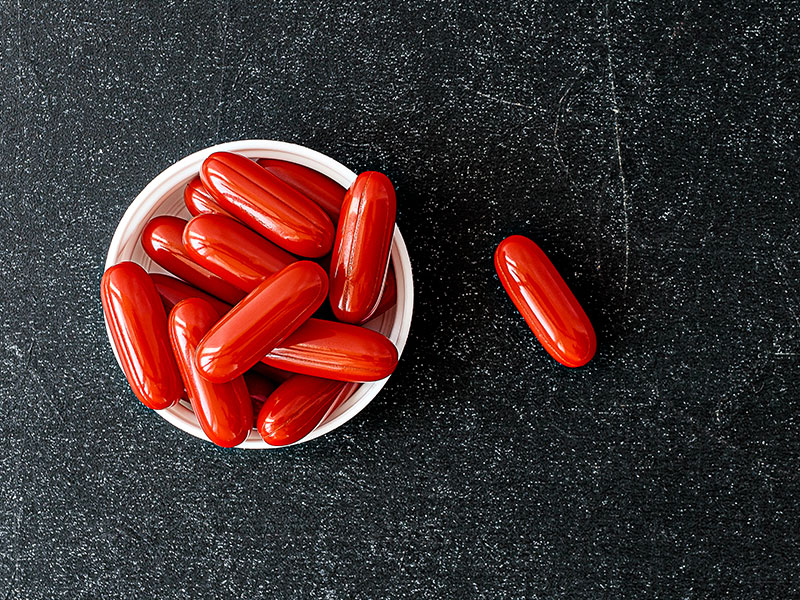No, Ubiquinol is not better than Ubiquinone and thus not better for heart health. Ubiquinone is the better choice when it comes to CoQ10 supplementation. Despite what you may have heard, a 2023 review article in Current Cardiology Reports shows that the marketing claims for ubiquinol are not founded in scientific evidence. Ubiquinone is the scientifically tested form of Coenzyme Q10 that is best for the prevention of cardiovascular disease and the reduction of cardiovascular mortality [Fladerer & Grollitsch 2023].

In his 2018 book, The Insider’s Guide to Coenzyme Q10, Dr. William Judy explained the difference between oxidized Coenzyme Q10 (ubiquinone) and reduced Coenzyme Q10 (ubiquinol). Dr. Judy recommended ubiquinone supplementation. Book available from amazon.com. ISBN 978-87-7776-186-7.
Fladerer and Grollitsch have reviewed 28 studies about the use of Coenzyme Q10 related to cardiovascular disease – 23 ubiquinone studies and 5 ubiquinol studies. All 28 studies were randomized, double-blind, placebo-controlled, parallel or cross‐over clinical trials. All 28 studies involved an intervention with more than 50 mg/day [Fladerer & Grollitsch 2023].
CoQ10 Supplementation and Heart Health Benefits
Fladerer and Grollitsch report the following main outcomes of their review of 28 studies:
- In studies using ubiquinone, there has been significantly reduced cardiovascular death in patients with heart failure. This has not been reported for ubiquinol.
- Achieving heart health benefits has required lower test concentrations in the ubiquinone studies than in the ubiquinol studies.
- Positive long-term effects reducing cardiovascular mortality have been observed only in the ubiquinone studies.
Comparison of Ubiquinone and Ubiquinol Clinical Studies
Most of the studies of ubiquinone supplementation have used 60 – 300 mg/day. Most of the ubiquinol studies have used much higher concentrations, typically, test concentrations between 300 and 600 mg/day [Fladerer & Grollitsch 2023].
Over the past 30 years, studies have shown that supplementation with ubiquinone alone or with ubiquinone combined with selenium has the following documented outcomes:
- reduced cardiovascular mortality in patients with heart failure [Mortensen 2014]
- improved ejection fraction [Judy 1993]
- reduced time of hospitalization [Morisco 1993; Mortensen 2014]
- reduced cardiovascular mortality in senior citizens [Alehagen 2013; Alehagen 2018]
The Best Ubiquinone and Heart Health Studies
Fladerer and Grollitsch have summarized the outcomes of the best ubiquinone studies.
- In a study of 641 patients with heart failure and ubiquinone supplementation of 160 mg/day for a year, Morisco et al. [1993] reported a significant reduction in hospitalization time.
- In the most often cited Q-Symbio study of 420 heart failure patients, Mortensen et al. [2014] administered 3 × 100 mg of ubiquinone per day for two years. The researchers reported significantly reduced time of hospitalization, improved NYHA class, and decreased cardiovascular and all-cause mortality.
- In the KISEL-10 study enrolling 443 community living senior citizens, Alehagen et al administered 200 mg of ubiquinone per day combined with 200 mcg of selenium per day for four years. The KiSel-10 study data showed significantly decreased cardiovascular mortality that persisted until 12 years after the initiation of the supplementation [Alehagen 2013; Alehagen 2018].
Quite simply, there are no comparable ubiquinol and heart disease studies [Fladerer & Grollitsch 2023].
The Misleading Marketing Claims for Ubiquinol Supplementation

In his book, Dr. William Judy discussed the differences in the absorption of ubiquinone and ubiquinol. He pointed out that there are considerable differences in the absorption of different commercially available CoQ10 supplements. It is important to choose a supplement with documented absorption and clinical efficacy.
In a 2021 review, Dr. William Judy summarized the fallacies in some of the most common misleading marketing claims for ubiquinol supplements:
- Claim: ubiquinol is better absorbed. Note that in a 2019 comparative study, Lopez-Lluch et al have shown that a ubiquinone supplement formulated with specific carrier oils and produced with a patented heating/cooling process has a significantly better absorption and bioavailability than a ubiquinol supplement from the same manufacturer.
- Claim: people over the age of 40 need to take ubiquinol. Note that the average age in the above-mentioned ubiquinone studies was 63 years (Q-Symbio study), 78 years (KiSel-10 study), and 67 years (Morisco study), respectively, good evidence of the falsity of the marketing claim that people over the age of 40 need ubiquinol rather than ubiquinone [Judy 2021].
- Claim: people taking ubiquinone supplements will not get enough ubiquinol. Note that Mantle & Dybring [2020] have discussed five enzyme systems that convert ubiquinone to ubiquinol as needed in the body, further evidence that one can get sufficient ubiquinol while taking a ubiquinone supplement.
Conclusions: Ubiquinone Supplementation Recommended for Good Heart Health
- As of 2023, no ubiquinol supplementation study has clearly demonstrated reduced cardiovascular disease mortality [Fladerer & Grollitsch 2023].
- Ubiquinone supplementation is more promising for the prevention of cardiovascular disease and the adjuvant treatment of heart failure patients [Alehagen 2013; Mortensen 2014].
- There is an additive beneficial effect when ubiquinone is combined with selenium [Alehagen 2013].
- Ubiquinone has been shown to reduce the adverse effects of statin medications [Caso 2007; Skarlovnik 2014].
- There have been no unwanted interactions when ubiquinone has been used as an adjuvant treatment in heart failure patients taking their conventional medications, i.e., ACE inhibitors, aldosterone antagonists, anti-coagulation medications, beta-blockers, digoxin, diuretics, statin derivatives, and diabetes treatments [Mortensen 2014].
Sources
Alehagen U, Aaseth J, Alexander J, Johansson P. Still reduced cardiovascular mortality 12 years after supplementation with selenium and coenzyme Q10 for four years: A validation of previous 10-year follow-up results of a prospective randomized double-blind placebo-controlled trial in elderly. PLoS One. 2018 Apr 11;13(4):e0193120.
Alehagen U, Johansson P, Björnstedt M, et al. Cardiovascular mortality and N-terminal-proBNP reduced after combined selenium and coenzyme Q10 supplementation: a 5-year prospective randomized double-blind placebo-controlled trial among elderly Swedish citizens. Int J Cardiol. 2013;167:1860–6.
Caso G, Kelly P, McNurlan MA, et al. Effect of Coenzyme Q10 on myopathic symptoms in patients treated with statins. Am J Cardiol. 2007;99:1409–12.
Fladerer JP, Grollitsch S. Comparison of Coenzyme Q10 (ubiquinone) and reduced Coenzyme Q10 (ubiquinol) as supplement to prevent cardiovascular disease and reduce cardiovascular mortality. Curr Cardiol Rep. 2023 Nov 16. doi: 10.1007/s11886-023-01992-6. Epub ahead of print.
Judy WV, Stogsdill WW, Folkers K. Myocardial preservation by therapy with Coenzyme Q10 during heart surgery. Clin Investig.
1993;71:S155–61.
Judy WV. The instability of the lipid-soluble antioxidant ubiquinol: part 3–misleading marketing claims. Integr Med (Encinitas).
2021;20:24–8.
López-Lluch G, Del Pozo-Cruz J, Sánchez-Cuesta A, Cortés-Rodríguez AB, Navas P. Bioavailability of coenzyme Q10 supplements depends on carrier lipids and solubilization. Nutrition. 2019 Jan;57:133-140.
Mantle D, Dybring A. Bioavailability of Coenzyme Q10: an overview of the absorption process and subsequent metabolism. Antioxidants (Basel). 2020 May 5;9(5):386.
Morisco C, Trimarco B, Condorelli M. Effect of Coenzyme Q10 therapy in patients with congestive heart failure: a long-term multicenter randomized study. Clin Investig. 1993;71:S134–6.
Mortensen SA, Rosenfeldt F, Kumar A, et al. The effect of Coenzyme Q10 on morbidity and mortality in chronic heart failure: results from Q-SYMBIO: a randomized double-blind trial. JACC Heart Fail. 2014;2:641–9.
Orlando P, Sabbatinelli J, Silvestri S, et al. Ubiquinol supplementation in elderly patients undergoing aortic valve replacement: biochemical and clinical aspects. Aging (Albany NY). 2020;12:15514–15531.
Skarlovnik A, Janic M, Lunder M, et al. Coenzyme Q10 supplementation decreases statin-related mild-to-moderate muscle symptoms: a randomized clinical study. Med Sci Monit. 2014;20:2183–2188.
The information presented in this review article is not intended as medical advice. It should not be used as such.









Leave A Comment